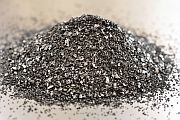
THURSDAY, Oct. 23, 2014 (HealthDay News) — A man who hoped to detoxify his body with a supplement known as activated charcoal may have instead triggered a case of the intestinal disorder known as colitis.
Activated charcoal is a supplement that soaks up gases and odors, making it a common treatment for people with flatulence. It’s also purported to be a treatment for colitis, according to a new report detailing the man’s condition.
While it’s not clear if the over-the-counter supplement actually made the man sick, he recovered after he stopped taking it, the report found.
People “should be wary of articles on the Internet which suggest activated charcoal can treat colitis, inflammatory bowel disease and irritable bowel syndrome. Our case report suggests activated charcoal can actually cause inflammation of the colon known as colitis,” said Dr. Jessica Davis, lead author of the new report, and a senior resident in internal medicine at George Washington University. “Patients should be aware that if they are taking over-the-counter or herbal supplements, they may cause more harm than benefit.”
She added that physicians should be aware that patients may be using activated charcoal. Davis also recommended that doctors keep this man’s experiences in mind and be on the look-out for other patients who may have had similar experiences.
Activated charcoal isn’t the regular charcoal that’s used in barbecues. Instead, it’s carbon that’s been superheated in order to create tiny crevices that can soak up substances, explained Dr. Pat Raymond, a fellow of the American College of Gastroenterology and assistant professor of clinical internal medicine at Eastern Virginia Medical School.
In medicine, activated charcoal is used in poisoning and overdose cases to soak up the poison or drug, she said. “It does a great job of absorbing medications that aren’t meant to be there,” Raymond said. In addition, it’s long been marketed as a treatment for people with flatulence since “it absorbs the gas, or at least the noxious odor.”
Activated charcoal is “generally felt to be a very benign” unless it absorbs medications that a person is taking, she said.
Activated charcoal has been touted online as a treatment for a number of digestive conditions, according to Davis. In the case she and her colleagues profiled in the new report, an alternative medicine practitioner told a 48-year-old man to take activated charcoal as part of general “detoxification” for fatigue.
According to the report, the man sought medical care within days after taking the treatment. He had stabbing pain in his abdomen, diarrhea and nausea, according to the report. The man was diagnosed with a possible case of colitis, a condition that inflames the colon and causes symptoms like diarrhea.
His symptoms improved when he stopped taking the charcoal supplements and began taking antibiotics.
“We cannot be 100 percent certain that the activated charcoal was the cause of colitis in our patient, but the timing of his symptoms occurring within days of starting activated charcoal was highly suspicious,” said report lead author Davis.
If the activated charcoal was the cause, could the man have simply taken too much? That’s also not clear. “The dosing recommendations for activated charcoal are not well-established,” Davis said. It’s also not known how the supplement might have caused colitis in the first place.
“The lesson for doctors is that, as with any treatment, even the most benign of medications has risks and benefits that must be weighed,” Davis said.
As for patients, they should be aware that over-the-counter and naturopathic medications can have side effects. “The use of any supplement or medication should be discussed with a doctor,” she said.
Raymond advises against colon cleanses because the colon does a good job of taking care of itself. Since the colon system essentially composts waste, getting it cleansed is akin to using a pressure washer on your compost heap, she said. “Leave it alone,” she advised.
The report is scheduled to be presented Oct. 21 at the annual meeting of the American College of Gastroenterology in Philadelphia. Reports released at meetings should be considered preliminary until they’ve undergone the peer review process required by major medical journals.
More information
For more about colitis, try the U.S. National Library of Medicine.
Copyright © 2026 HealthDay. All rights reserved.

